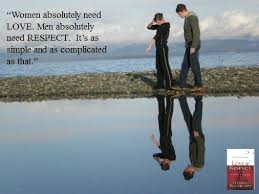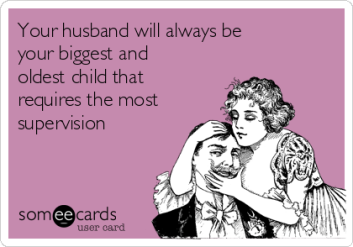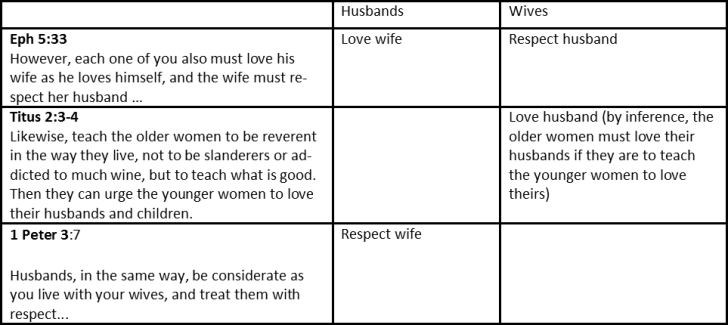
“Women need love, but men need respect.” How often have you heard this, or similar statements? And so often, they are met with wisely knowing nods and exclamations (“oh, so true!”), and likes and shares on Facebook. These overly simplistic notions are popular when it comes to people trying to sort out the perceived differences between men and women. It’s tempting to latch onto these statements which offer a cut and dried view of an issue, find some aspect that resonates with our experience and declare it to therefore be “true.”
Oddly enough, women who loudly acclaim the truth of these pop psychology and complementarian notions of male and female also often seem to be the ones who post memes with sentiments of this nature:

Some people find this meme funny. Sigh. To me, it sadly degrades men. That’s not something I want to be part of, because I believe both men and women to be basically worthy of respect. I hate statements that put women into neat boxes, because they so often don’t fit me or other women I know. So I have no right to make statements, especially derogatory ones, which do the same to men.
“The Bible says men need respect, women need love” – or does it?
But back to the matter of love and respect. This “men need respect, women need love” idea is frequently touted in Christian circles, and some people will add, “the Bible says.” It is an idea common in complementarian[1] circles. Here is an example:
“Women need to feel loved, and men need to feel respected. This may explain why Paul wrote in Ephesians 5:33 that a husband must love his wife and a wife must respect her husband. Both commands are unconditional. The hard part is that respect comes more easily to men, and love comes easier to women.”[2]
Let’s start by saying there is no verse in the Bible which says this.
Those who believe this to be true generally back it up with Ephesians 5:33, “However, each one of you also must love his wife as he loves himself, and the wife must respect her husband.” Did Paul intend this verse to indicate that one sex has needs in regard to love and respect that the other does not?
“Love? What a crackpot notion!”
Why does Paul seem to make this division? Well, let’s backtrack a little and have a look at the cultural backgrounds of the people Paul is writing to. It was infinitely different to our society, where we expect that two people meet, fall in love and possibly eventually get married and live in partnership (not necessarily a truly equal one, but there is some expectation that both get a say and have a share of the responsibility in the relationship). While I don’t believe our society always has a useful understanding of what love really is, it is still an expected foundation of marriage. Not so in the Graeco-Roman world. Fourth century orator and statesman, Demosthenes, wrote, “Mistresses we keep for the sake of pleasure, concubines for the daily care of the body, but wives to bear us legitimate children.”[3] Yes, there were more expectations of wives than simply childbearing – the management of the household staff was one such expectation. But the important point here is that for both men and women, love was not an expectation within marriage at all.
In marriages of this time, women were powerless and vulnerable. Paul, in his wisdom, does not ask them to just get their act together and love their husbands. He settles for respect – a foundation without which love is, at best, severely hindered. We can respect people whom we do not love, but how often (if ever) can genuine love and total disrespect coexist?
Culturally, in this context, men had all the power. Paul appeals to them to do something unbelievably radical when he asks them to love their wives, not just with sexual love (eros) or with loving affection (phileo), but with active, sacrificial agape love. I imagine that the men of Ephesus must have been affronted and perplexed by this seemingly crackpot notion. But Paul was adamant – it was what Christ called them to. If the marriages of these relatively new Christians were to change and become truly Christlike, then they would have to be characterised by love, and that change would have to come firstly not from those who were vulnerable, but from a change in the attitudes and behaviours of those to whom they were most vulnerable. For husbands to sacrificially love their wives would be for them to give up their position of power in order to put the needs of their wives first. They were not to consider how they could lead their wives, but how they could serve them. Only by voluntarily yielding in love to their wives could husbands in that cultural setting hope to create the circumstances in which their wives could respond in genuine love to them.
Love and respect across the New Testament
If we take a broader view of the New Testament, we will see that husbands and wives are both called to love and respect one another:

There you have it: love and respect in marriage – a two way street.
Do men need love?
To just focus on love for a moment, do men need love? Psychology aside, it would be a very poor theological argument which said they didn’t. If ever there was a document which focussed incessantly on love, it would have to be the New Testament (there are 270 references to love/loves/loved/loving in the NT, on the basis of a Bible Gateway search of the NIV). Did God intend the New Testament to speak only to the needs of women? That would be laughable. The command to “love one another” must surely be the most repeated phrase of the New Testament (John 13:34-35, 1 Pet 1:22, 1 Pet 3:8, 1 John 3:11, 1 John 3:23, 1 John 4:7, 1 John 4:11-12, 2 John 1:5). There are various other exhortations which are a slight twist on this command, such as “serve one another in love” (Rom 12:10, Rom 13:8, Gal 5:13, Eph 4:2, Heb 10:4, Heb 13:1, 1 Pet 5:14), and some commendations to those who are demonstrating love (1 Thess 4:9, 2 Thess 1:3). We see love modelled within the Godhead (Matt 3:17). Love, above all things, is what should characterise every thought, word and action of the Christian (1 Cor 13).
Note how intrinsic love is in our response to God: “We love because he first loved us” (John 4:19). Not “we respect because he first loved us”! How half-hearted a response would mere respect be in response to God’s great love? Our response to Jesus is never respect without love or love without respect. Our response to Him models how we should live in human relationships. In Romans 12:10, love and respect (honour) go hand in hand – “Be devoted to one another in love. Honour one another above yourselves.” If it is this way for all believers generally, then how much more so should the Christian marriage model love above all things? To teach that wives need only to respect (and not love) their husbands or that men have do not have a need for love seems to me to be a particularly unchristian belief.
So the true biblical teaching is that husbands and wives should love and respect one another. True love and true respect will flourish best together.
You can follow the God’s Design – Perth blog via our Facebook page or by signing up to receive posts by email…or preferably both . From time to time, additional items of interest are published on the Facebook page, which are not found on the blog. However, Facebook does not show all those who “like” the page all of my posts all of the time. To be sure you will not miss out on great content, I would encourage you to sign up for both.
[1] Complementarians believe that the Bible teaches that men and women are “equal but different,” with “different” primarily meaning that men have the role of leadership and decision-making in the church and home, and a woman’s role is always a supporting one.
[2] Emerson Eggerichs, author of Love and Respect, http://www.focusonthefamily.com/marriage/communication-and-conflict/the-love-and-respect-principle/basics-of-love-and-respect. Numerous other complementarian authors have also expressed this view, including Douglas Wilson on John Piper’s Desiring God site (http://www.desiringgod.org/articles/love-and-repect-basics-for-marriage), Shaunti Feldhahn in her book For Women Only: What You Need to Know About the Inner Lives of Men (http://www.imom.com/the-five-respect-needs-of-men/#.Vsk9X_l97IU).
[3] Gordon D. Fee, “The Cultural Context of Ephesians 5:18-6:9,” Priscilla Papers, vol. 16, no. 1, 2002, http://www.cbeinternational.org/resources/article/cultural-context-ephesians-518%E2%80%9369-0?page=show



I love all those verses about love!
We all have a need to be loved and we all have a responsibility to be love. As Christians, both men and women, both husbands and wives, should follow Jesus’ example and love sacrificially: “walk in the way of love, just as Christ loved us and gave himself up for us” (Ephesians 5:2).
LikeLike
I like that – “a responsibility to BE love.” How else would anyone see Christ in us?
LikeLiked by 1 person
Excellent post. Thank you
LikeLike
You’re welcome.
LikeLike
I love this! I also LOVE that you feel you don’t fit most cultural female stereotypes. I don’t either! Though well intentioned a lot of christians are teaching cultural gender roles that aren’t biblical AT ALL. And sadly I believe men don’t really take the time to dissect the bible because a lot of these misconceptions benefit them. And women don’t say anything out of fear of not appearing “submissive”. I identify more with characteristics that are stereotypically male and Ive always felt out of place. Thank you so much for writing this article. I am so happy I am not alone. By biblical defintion respect is included in love. 1 corinthians 13:4-
LikeLike
GOD Bless in JESUS’ Name.
As older women are told in Titus to teach younger women how to love their husbands it must be true that we are to love one another. Respect and understanding undergird any relationship even with a wild or tamed animal or opposing nations, and much more with a husband and wife.
So much of the Bible is pulled out to serve a particular interest or points of views.
LikeLike
I am admire and appreciate the clarity you brought to Paul’s admonition to the Ephesians by placing it within the appropriate contacts. Thank you!
LikeLike
Thank you for taking the time to give some positive feedback. You may like to follow my blog via email and/or through my Facebook or Twitter accounts.
LikeLike
Just discovered this blog … fantastic. I always struggled when reading books to filter out the cultural partriarchal crap and take what God wants for me in terms of character building.. Its a rough road when so many books/authors/preachers etc take verses out of context regurgitating what they have learned or reinforcing what benefits them. I will be following this blog and backreading articles!!!
LikeLike
Thanks Christine for your encouraging words!
LikeLike
I just found this blog and have always believed that respect was missing from my marriage, but just couldn’t understand why I needed it.
Now I can see from your teaching, that both love and respect are needed by men and us too!
Thank you for the clarity! I will be sharing this with both my male & female friends & family.
God Bless You!
LikeLiked by 1 person
Thank you Marie! God’s truth truly does set us free, while the law we are always inventing for ourselves imprisons. God bless you as he leads you further on into his truth.
LikeLike
I’m a man and I’ll be honest the article confirmed a new realization.
I used to believe in the old saying that Men need respect and Women need love. I didn’t experience a lot of love growing up so the saying motivated a lot of toxic masculinity in me, but a lot has changed when I realised that we all need and responsible to give both.
Thank you for such a good read.❤️
LikeLiked by 1 person
Thank you for your feedback and for sharing that! I’m so glad this was helpful. You may like to subscribe to my blog. 🙂
LikeLike
“Complementarians believe that the Bible teaches that men and women are “equal but different,” with “different” primarily meaning that men have the role of leadership and decision-making in the church and home, and a woman’s role is always a supporting one.”
They believe that because that’s literally what it says in Genesis.
LikeLike
Hi Jack, thanks for commenting. You may have been told that this is what Genesis says, but I respectfully disagree. I presume that you are primarily referring to Gen 1-3 – if you had something else in mind, please let me know.
There’s a lot to say about these 3 chapters, but here are a few basic points:
– Genesis 1 goes out of its way to set man and woman up as equals. This is in stark contrast to other ancient Near Eastern beliefs about the origins of the world, where the creation of women was often seen as some sort of cruel joke on men.
– Both man and woman are intentionally made by God to fulfil his commission on this Earth. That commission can’t be fulfilled without both sexes. It doesn’t say men are to rule while women look after the children or anything of that sort.
– Gen 2 gives a second version of the creation story, in which man is created first and is lonely. God decides to make a “helper suitable for him.” Some people interpret this to mean “the man is the leader and the woman is the (inferior/subordinate) assistant.” The problem is that the text does not say this. The Hebrew word for helper, ezer, occurs 22 times in the OT – 2 instances referring to the woman in Gen 2, 3 referring to nations giving Israel military support from their position of strength, and in all other instances, referring to God. If God is our helper, is he inferior to us? Of course not! He can help us because of his superior strength and wisdom. The author of Genesis didn’t want to imply that woman was superior to man, so he added a qualifier – “kenegdo,” why but means “equal to” or “face-to-face with.” In this instance, the woman would help the man with his loneliness (something he couldn’t fix by himself), and in many other instances, men help women. We each lend our strength, abilities, comfort, support and wisdom to the other throughout life.
– In Gen 3, some interpret verse 16 (“…your desire will be for your husband, and he will rule over you”) to mean God wishes men to rule over women. But hang on…this passage isn’t about good and positive things, but about negative outcomes of the Fall. Men ruling over women is one of these negative outcomes!
– Before the Fall, we see only harmony and equality between men and woman. Afterward…oh dear. By chapter 4, polygamy disrupts the “one flesh” union of man and wife. Before Genesis is over, we will see rape, men putting their safety ahead of their wives and daughters’ safer, prostitution and all manner of damaging outcomes for women at the hands of men.
– As Christians, is it our role to perpetuate the negative outcomes of the Fall, or to work against them? We will continue to suffer from them until the “new heaven and new Earth” come about, but we should be actively working against those consequences!
Gen 2:18 does literally say in the Hebrew that men and women are equal. Nothing in Gen 1-3 says that the differences that exist between men and women should or must result in different roles, and specifically, it doesn’t say women are relegated to a secondary role.
Does the Old Testament as a whole teach men must lead and rule, and that they must fit into a certain box which defines what they must do? You might get some surprises in my 2 part series on men in the OT, which begins here: https://godsdesignperth.org/2015/05/21/surprising-men-of-the-old-testament-part-1/.
LikeLike
Fair enough, you make valid points with regards to the Old Testament. But certainly the New Testament reiterates the idea.
“the head of a wife is her husband” 1 Corinthians 11:3
“For the husband is the head of the wife” Ephesians 5:23
“Likewise, husbands, live with your wives in an understanding way, showing honor to the woman as the weaker vessel” 1 Peter 3:7
LikeLike
The bible tells the man to honor and respect his wife, not just to love her.
LikeLike
That is absolutely true. It also tells wives the same. The biblical view of marriage is one of mutuality.
LikeLike